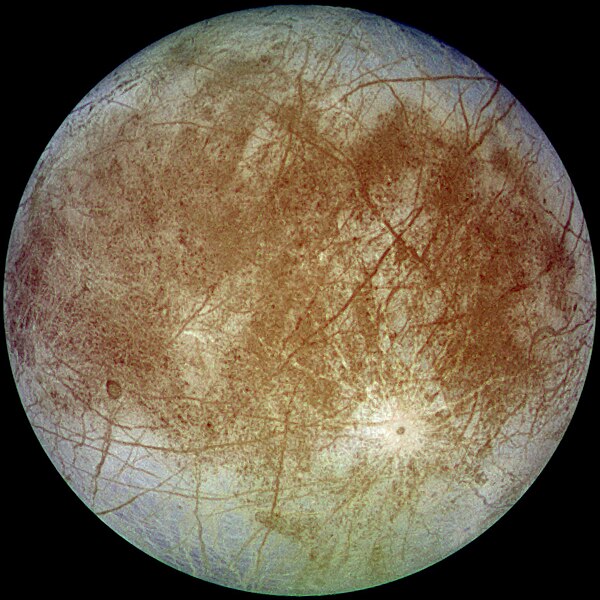The European Jupiter Ganymed Orbiter would focuss on Ganymed, the largest moon in the solar system and the only one with a significant magnetic field, which it will investigate.
The American Jupiter Europa Orbiter would instead focus on Europa, and especially on the composition of the ice field, as well as map the moon thoroughly, to identify possible future landing sites. Especially points where the ice sheeth is thinner.
It will also try to map the internal structure of the moon, which is up to now pure guesswork based on a few results. The orbiter would carry an ice penetrating radar, which could be used to estimate the thickness of the ice.
Although Europa is relatively far a way from the Sun it is kept warm by tidal heat. It's orbit around Jupiter is slightly eliptical, meaning that it is stretcehd and squashed by Jupiter's gravitational forces, which creates heat and 500 meter high tides in its interior. According to several experts life on Europa could well exist even beyond single cell microorganisms although even just finding simple bacteria would be a sensation.
 |
| Europa. The darker regions are where the water ice has a higher mineral content. (Credit: NASA) |
The two orbiters will be indipendently developed by both space agencies, and each would be a significant mission in their own right. ESA is expected to name this their flagship mission for the next few years, meaning that financial support on the european side is assured. NASA has also promised support for the mission but has a larger number of other missions to pay for.
Fascinating.
ReplyDeleteInteresting. Finding life in a moon.
ReplyDeletePrepare yourself Jupiter!
ReplyDeleteThis comment has been removed by the author.
ReplyDeleteLooking forward to what they find out
ReplyDelete@Bdgorsh, good point :D
ReplyDeleteman that is some interesting stuff it blows my mind to think about all this
ReplyDeleteyour friend,
ectomorphmuscle.blogspot.com
I say let them have fun finding martian shrimp.
ReplyDeleteprepare yourself aliens! its almost time for assrapin
ReplyDeleteI wonder if they have purple drank on Jupiter's moon.
ReplyDeleteI'll be keeping an eye on this
ReplyDeleteYeah, there's this crazy organic matter on Europa that rains from the sky and then evaporates back into the atmosphere...they think it could actually be a living organism(s). I was always especially by that...life will find a way.
ReplyDeleteInteresting and amazing how much there is still left to be discovered in space :)
ReplyDeleteI'm pretty surprised NASA can even be a part of this judging by there massive cutbacks in funding. I'll still be interested to see how this develops.
ReplyDeleteTidal Heat sounds dangerous. I still dont understand how it works.
ReplyDeleteAfter I finish college I want to work for the ESA. Damn straight!
ReplyDeleteWhat a fun job it must be, to design something that explores other worlds and discovers life-changing things...
ReplyDeletePretty sweet, I studied this in school, the vents in the lower crust which the liquid water could be could maintain microorganisms or bigger life such as fish, proving we aren't alone in the universe. Even though my concern is that there isn't other life (because there obviously is) its the intelligent life is what I ponder about. But on another note I've always wondered about how to reverse the atmosphere on Venus. Possibly 1000 hydrogen bombs and a few comets and it would be a literal sister planet to earth. Twin planets eh?
ReplyDeleteThis is so exciting :)
ReplyDeleteIt's interesting but it's still a bit fucked up that we can find money to study some ice moons while our own ice caps are melting away every day
ReplyDeletewow, pretty interesting stuff.
ReplyDeletestraight to the moon. I'd prefer a manned mission to mars first.
ReplyDeleteI hope they find other life soon!
ReplyDeletexx
If there is water content on this moon, then hopefully scientist can find life.
ReplyDeletehopefully someday humans and anlien fish of the icy moon can live in peace
ReplyDeleteThey're drilling a sub-glacial lake in Antarctica at the moment that might discover the type of life that could survive on Europa - cool post bro
ReplyDeleteI've always wondered if they'd do a Europa mission in the future and I'm pretty excited for this! Europa is my favorite moon and I can't wait for the results.
ReplyDeleteI love space!
ReplyDeleteSo fascinated with space stuff. Lets hope they go. They were meant to go to Mars first though weren't they? Ohwell. Good to see they are planning stuff other than the moon.
ReplyDeletewow great news. we are so close to colonization on other planets
ReplyDeletethat will be the future address of my great (x9999) grandchildren.
ReplyDeleteMy IQ has just gone up a few notches :L
ReplyDeleteEver since I was in elementary school, they've been talking about the potential for life on Jupiter's moons. I hope they get some progress on this.
ReplyDeleteyknow what sounds like a great idea: lets spend millions on researching a moon of planet thats so far away we wont reach it for many many generations, while we still have only 1/4 of our current people living in wealth
ReplyDeleteWhile I agree that there are some problems on earth, I'm totally for space exploration. I'd cut military spendings worldwide in half, and there would be more than enough money to make my childhood dreams come true.
ReplyDeleteSpace exploration is absolutely fascinating.
ReplyDeleteI'm stunned by all of the progress we've made involving space recently!
ReplyDeleteThat would be very intense haha
ReplyDeleteoh man I whish we would get clear pictures from that icy babe.
ReplyDeletewhat if thisis is like the snow planet in star wars ?
yeeaaaahhhh
Europa looks beautiful.
ReplyDelete